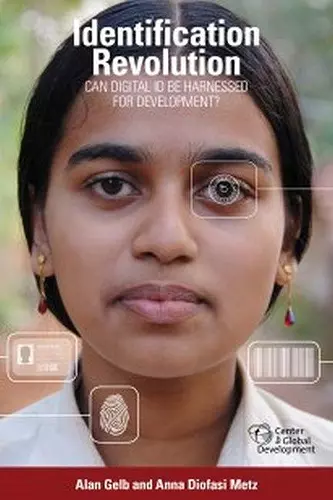Identification Revolution
Can Digital ID be Harnessed for Development?
Alan Gelb author Anna Diofasi author
Format:Paperback
Publisher:Center for Global Development
Published:30th Jan '18
Should be back in stock very soon

Some 600 million children worldwide do not legally exist. Without verifiable identification, theyand unregistered adultscould face serious difficulties in proving their identity, whether to open a bank account, purchase a SIM card, or cast a vote. Lack of identification is a barrier to full economic and social inclusion.
Recent advances in the reach and technological sophistication of identification systems have been nothing less than revolutionary. Since 2000, over 60 developing countries have established national ID programs. Digital technology, particularly biometrics such as fingerprints and iris scans, has dramatically expanded the capabilities of these programs. Individuals can now be uniquely identified and reliably authenticated against their claimed identities. By enabling governments to work more effectively and transparently, identification is becoming a tool for accelerating development progress. Not only is provision of legal identity for all a target under the Sustainable Development Goals, but this book shows how it is also central to achieving numerous other SDG targets.
Yet, challenges remain. Identification systems can fail to include the poor, leaving them still unable to exercise their rights, access essential services, or fully participate in political and economic life. The possible erosion of privacy and the misuse of personal data, especially in countries that lack data privacy laws or the capacity to enforce them, is another challenge. Yet another is ensuring that investments in identification systems deliver a development payoff. There are all too many examples where large expendituressometimes supported by donor governments or agenciesappear to have had little impact.
Identification Revolution: Achieving Sustainable Development in the Digital Age offers a balanced perspective on this new area, covering both the benefits and the risks of the identification revolution, as well as pinpointing opportunities to mitigate those risks.
Digital ID is fast becoming an essential tool for twenty-first century development. This book spells out in fascinating detail the opportunities and challenges, the perils and pitfalls of this digital ID revolution."- Ngozi Okonjo-Iweala, Board Chair, GAVI; former Finance Minister, Nigeria; former Managing Director, World Bank;
"Anyone interested in the current transformation of identification and registration systems underway internationally—students, researchers, policymakers or implementers—should begin with this book."- Keith Breckenridge, Professor and Deputy Director, Wits Institute for Social and Economic Research;
"This excellent book affords invaluable practical guidance for states and governements hoping to reap development gains while avoiding the serious pitfalls in engaging with this most important governance revolution of the third millennium CE."- Simon Szreter, Professor of History and Public Policy, University of Cambridge;
"It is no exaggeration that there is an Identification Revolution and it is important and moving rapidly. [This book's] masterful presentation brings the reader up to date, analyzing the potential benefits and pitfalls of biometric ID. This is a must read for all those interested in economic development and the potential that the ID Revolution offers."- Anne O. Krueger, Senior Research Professor, Johns Hopkins School of Advanced International Studies; Senior Fellow, Stanford Center for International Development;
"This is a must-have manual for anyone interested in the important topic of identification systems as drivers of social and economic develoment. . . . I expect it will remain a top reference in this field for many years to come."- Joseph Atick, Executive Chairman, ID4Africa,; Executive Chairman, Identity Counsel International;
"Alan Gelb and Anna Diofasi Metz have done a remarkable job of studying recent advances in the sophistication of ID systems across the globe. They offer a unique lens on what is possible, what has been done, and more importantly, why it was done. This kind of critical look at the design choices of an ID system is illuminating specially since they capture the context in which those decisions were taken."- Nandan Nilekani, Cofounder and Non-Executive Chairman, Infosys; Founding Chairman, Unique Identification Authority of India; Cofounder and Chairman, EkStep Foundation
ISBN: 9781944691035
Dimensions: unknown
Weight: 395g
272 pages